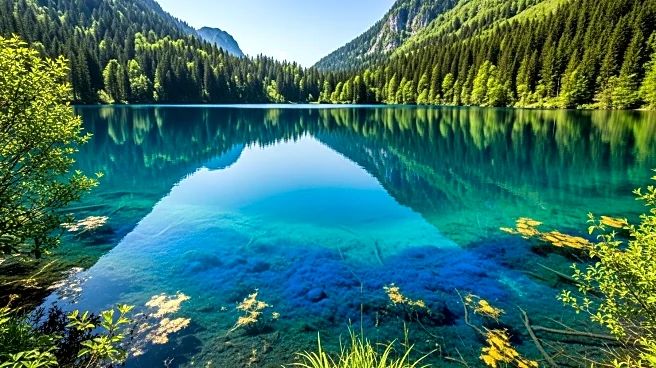What's Happening?
Eryri National Park has issued a warning to visitors regarding the presence of harmful blue-green algae in Llyn Tegid, Wales' largest natural lake. The park authority advises visitors to avoid direct contact with the algae, which can be identified by bright-green scum floating near the shorelines. Blue-green algae, or cyanobacteria, thrive in warm, shallow, nutrient-rich waters and can produce toxins harmful to humans and animals. Symptoms from exposure include skin rashes, eye irritation, vomiting, and fever. Dogs and livestock are particularly vulnerable, with potential for severe or fatal illness. The park's lake wardens closely monitor water conditions, especially during summer when algal blooms are most common. Safety notices are prominently displayed around the lake to inform visitors of the risks.
Why It's Important?
The warning about blue-green algae at Llyn Tegid is significant due to the potential health risks it poses to both humans and animals. As the lake is a popular destination for water sports, the presence of toxic algae could impact recreational activities and local tourism. The health risks associated with exposure to the algae underscore the importance of environmental monitoring and public awareness. The situation highlights the broader issue of water quality management in natural bodies of water, which is crucial for safeguarding public health and preserving ecological balance.
What's Next?
Eryri National Park will continue to monitor the water conditions at Llyn Tegid, especially during periods of warm weather when algal blooms are more likely to occur. Visitors are advised to heed safety notices and avoid entering the water if algae are present. The park may implement additional measures to ensure visitor safety and mitigate the impact of the algae on recreational activities. Local authorities might also consider educational campaigns to raise awareness about the risks of blue-green algae and promote safe practices for lake users.
Beyond the Headlines
The presence of blue-green algae at Llyn Tegid raises broader environmental concerns about the impact of climate change and nutrient pollution on aquatic ecosystems. As global temperatures rise, the frequency and intensity of algal blooms may increase, posing challenges for water management and conservation efforts. This situation calls for a deeper examination of human activities contributing to nutrient enrichment in water bodies, such as agricultural runoff and wastewater discharge, and the need for sustainable practices to protect natural resources.









